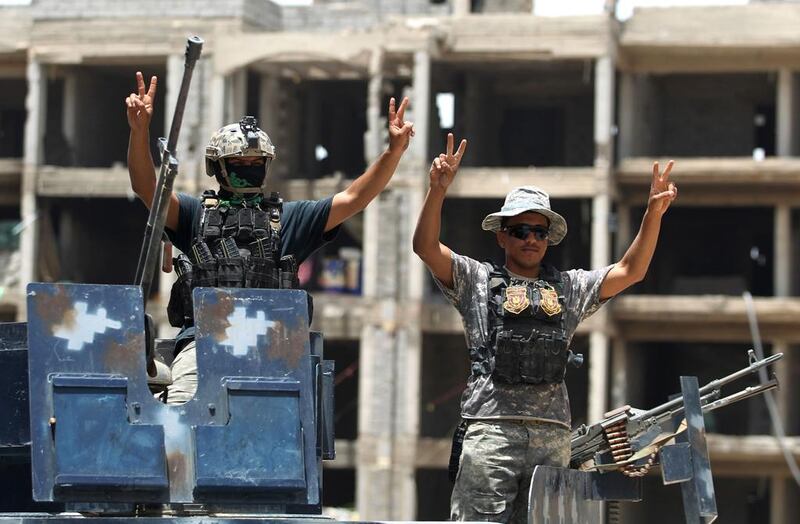Beirut // Arab-Kurdish fighters backed by the United States cut the ISIL’s main supply route between Syria and Turkey on Friday in a major setback for the extremists.
The Syrian Democratic Forces (SDF) completely surrounded the ISIL-held town of Manbij after a 10-day offensive, dealing another blow to the group as it comes under growing pressure on multiple fronts in Syria and Iraq.
“The Syrian Democratic Forces cut off the last road from Manbij to the Turkish border,” said the Syrian Observatory for Human Rights, a Britain-based monitoring group.
The US envoy to the anti-ISIL coalition backing the SDF, Brett McGurk, confirmed the road had been severed.
ISIL “terrorists now completely surrounded with no way out”, he wrote on Twitter.
Manbij lies at the heart of the last stretch of territory along Turkey’s border still under ISIL control, and was a key point on the group’s supply line from Turkey. Other secondary roads to the frontier are more dangerous and difficult to access, the Observatory said.
This week the SDF, backed by coalition air strikes, cut the road north out of Manbij to the ISIL-held border town of Jarabulus, which the extremists had used as a transit point for fighters, money and weapons.
The SDF also blocked the road south out of Manbij heading to its stronghold in Raqqa province.
“For the jihadists to reach the Turkish border from Raqqa, they now have to take a route that is more dangerous because of regime troops nearby and Russian air strikes,” the Observatory head, Rami Abdel Rahman, said.
Russia launched air strikes in support of president Bashar Al Assad’s regime in Syria in September. Moscow and Washington – despite backing different sides in Syria’s five-year conflict – have both focused efforts on fighting ISIL.
Thousands of residents have fled Manbij, which has been held by ISIL since 2014, but extremist fighters who evacuated their families stayed to defend the town, the Observatory said.
About 20,000 people still live in the town, which had a pre-war population of about 120,000 – mostly Arabs and about a quarter Syrian Kurds.
Last month, the SDF attacked ISIL on two fronts, from the north of Raqqa province towards Manbij and in the direction of the ISIL-held town of Tabqa, which lies south of Manbij on the same vital supply line to Turkey.
Syrian government forces and their allies are also advancing towards Tabqa and on Friday took control of a strategic crossroads in Raqqa province, the army and a monitoring group said.
The seizure of the junction, which leads to to Tabqa and as well as Raqqa city, ISIL’s de facto capital, came as part of a week-old Syrian government offensive against the jihadists, backed by Russian air power.
The Observatory said government-allied forces were 15 kilometres from Tabqa. A military source said in February that Tabqa, about 50km west of Raqqa city, would be the first target of a Syrian government attack in Raqqa province.
The army said a large number of ISIL fighters had been killed in the campaign. The Observatory said about 80 militants had died.
It was the first confirmation by the army that it had advanced into Raqqa province itself, after beginning the campaign farther west in Hama province.
The Observatory said US-backed forces north of Raqqa were also advancing, but slowly.
In neighbouring Iraq, the government’s elite counterterrorism service moved to within three kilometres of central Fallujah on Friday, the operation’s commander said.
Lt Gen Abdelwahab Al Saadi said forces also consolidated positions in the south of the city, one of the last two major urban centres still held by ISIL in Iraq.
“Daesh wanted the battle to take place outside the city but we have moved in, and retaken all this area in eight days,” he said, standing on rooftop on the edge of the Shuhada neighbourhood.
“We’ll be there, in the very centre, in days. Days, not weeks,” he said.
Over the past two years ISIL has made enemies of all global powers and regional governments. It has imposed harsh rule over millions of people in Syria and Iraq, carried out mass killings and rapes, joined conflicts in Libya, Yemen and Afghanistan and claimed responsibility for deadly attacks in Paris and Brussels.
The group has also suffered recent setbacks in Libya, where forces loyal to the country’s new UN-backed government entered the extremists’ coastal bastion of Sirte on Thursday.
* Agence France-Presse and Reuters





